Ever said no to someone and then felt like the worst person ever? Like, you know it’s the right call, but this heavy guilt just creeps in, making you second-guess everything? Yup, been there. I remember this one time I told my friend I couldn’t make it to her big party. I was wiped out from work, my inbox was a mess, and I just needed a night to chill with my cat and a cup of tea (yeah I know ‘We are responsible for our self-care boundaries’). I sent a polite, “I’m really sorry, I can’t,” and thought I was good. But then I lay awake for hours, staring at the ceiling, my brain going, “Am I selfish? Cold? Flaky?” Even when saying yes would’ve burned me out, my no still dragged guilt behind it like a clingy shadow. 😔
If you’re nodding along, you’re not alone. That guilt when you say no is super common, especially for folks in their 20s to 40s trying to juggle work, friends, family, and maybe a little self-care. Why does it feel so wrong to put ourselves first? And how do we stop feeling like jerks for it?
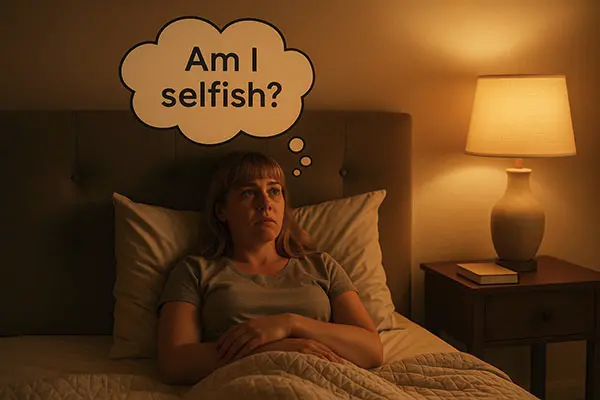
In this article, we’re gonna unpack why saying no feels so heavy, why it’s extra tough with parents, what guilt-tripping’s all about, and how to say no without hurting others or yourself. Plus, we’ll dig into why some people don’t feel guilt at all and what that means. Ready to ditch the guilt and own your no?
Why Does Saying No Feel So Wrong?
So, why does saying no feel like you’re committing a crime? It’s not just you there’s a whole mess of reasons why we get hit with guilt. First off, we’re kinda programmed to say yes. From the time we’re kids, we’re taught that being nice means helping others, being agreeable, and putting their needs first. Saying no feels like we’re breaking that rule, like we’re suddenly the villain in our own story.
Then there’s the fear factor. We worry that saying no will make someone mad, disappointed, or think we’re selfish. That fear of conflict or rejection can be paralyzing. I mean, who wants to deal with an awkward vibe or lose a friend? According to Psych Central, this fear often comes from taking “unhealthy responsibility” for others’ feelings, like we’re supposed to control how they react. Spoiler: we can’t. 😅
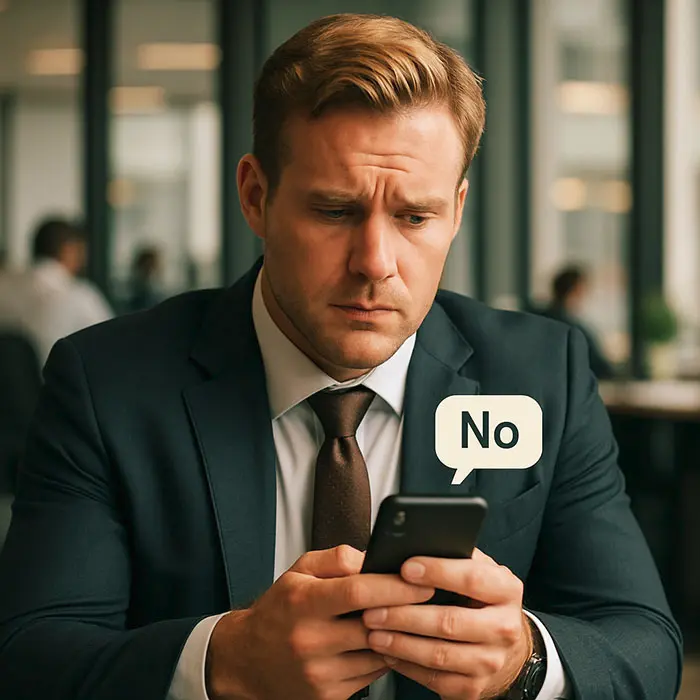
Another biggie is people-pleasing. If you’re like me, you might’ve spent years saying yes to keep everyone happy, even when it left you drained. Psychology Today says this comes from deep beliefs about self-worth or wanting to be liked. We think saying no makes us “bad,” but really, it’s just us trying to protect our energy.
And let’s not forget negativity bias. DiveThru explains that our brains are wired to focus on negative outcomes like worrying that saying no will hurt someone w ay more than positive ones. So, we imagine the worst-case scenario (they’ll hate us forever!) and cave. But here’s the truth: most of the time, people are fine with your no. They move on, and the world keeps spinning
That Time I Said No and Couldn’t Sleep
I told my friend I couldn’t make it to her event. I had a legit reason exhoustion, work overload, needing a night to just *be*. But after texting “I’m really sorry, I can’t,” I stared at the ceiling for hours.
Was I selfish? Cold? Flaky?
Even when my *yes* hurts me, my *no* still drags guilt behind it like a shadow.
The Real Reason Saying No Feels So Wrong

It’s not just about disappointing people. Saying no can feel like you’re breaking some silent contract the one that says your worth comes from how helpful, flexible, or agreeable you are.
For many of us, “no” means conflict. Rejection. Being seen as difficult. Especially if you were raised to avoid confrontation, prioritize others, or keep the peace no matter what.
Why Saying No to Parents Hits Different
Saying no to parents? Oh, that’s a whole other level of guilt. It’s like your heart’s screaming, “I’m a terrible kid!” even when you know you’re doing the right thing. Why’s it so tough? For one, parents often carry this emotional weight maybe they’ve sacrificed a ton for you, or you grew up with “family first” vibes like I did. Saying no can feel like you’re betraying that bond.
Cultural norms play a big role too. In many cultures, respecting elders means always saying yes, no questions asked. Talkspace points out that violating these norms can trigger deep guilt, especially if you were raised to prioritize family duty. For me, saying no to my mom’s request to visit felt like I was letting her down, even though I was swamped with work and needed a breather.
But here’s the deal: even with parents, your needs matter. Saying yes to every request can leave you resentful or burned out, which isn’t good for anyone. The trick is to say no with love like, “Mom, I love you, but I’m wiped out this weekend. Can we plan for next week?” It’s not about cutting them off; it’s about balancing their needs with yours
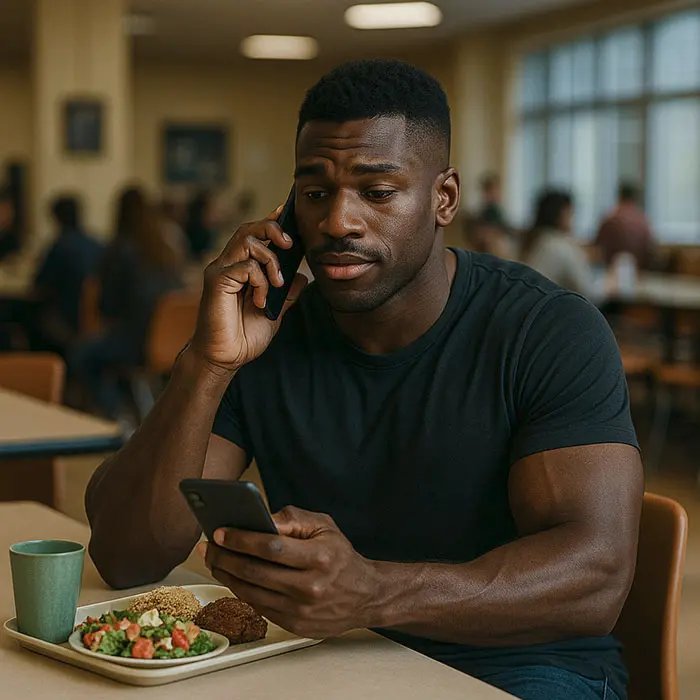
How I Learned That Guilt Isn’t Always a Sign I’m Wrong
One time I said no to a project I didn’t have capacity for. The guilt didn’t wait it slammed in like a wave. I imagined everyone thinking I was lazy. Irresponsible.
But a mentor told me: “Guilt isn’t always truth. Sometimes it’s just your conditioning being challenged.” That one sentence changed how I saw boundaries forever.
What’s Guilt-Tripping and Is It a Red Flag?
Ever say no and get hit with a response like, “I guess I’m just not important to you”? Yup, that’s guilt-tripping. It’s when someone tries to make you feel bad for not doing what they want, often to manipulate you into changing your mind. WebMD calls it “false guilt” feeling like you’ve done something wrong when you haven’t
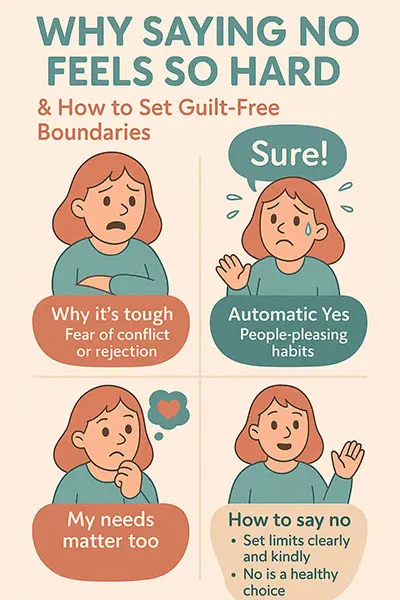
The Hidden Energy Cost of Saying Yes Too Much
Is it a red flag? Heck yeah. Guilt-tripping shows a lack of respect for your boundaries and can be a sign of unhealthy dynamics. If someone’s constantly making you feel bad for saying no, it’s not about love it’s about control. I had a friend who’d pull the “you’re abandoning me” card every time I said no to plans. It took me a while to see it, but that was a red flag waving big time.
If you’re dealing with guilt-tripping, stay firm. You can say, “I hear you’re upset, but I need to stick with my no.” If it keeps happening, it might be time to rethink that relationship. Healthy people respect your boundaries, even if they’re bummed at first. 😊
What to Tell Yourself Instead
Here are a few lines I’ve used when guilt creeps in after a no:
– “I’m allowed to choose what’s right for me, even if someone’s disappointed.”
– “I can’t help others when I’m depleted.”
– “Saying no isn’t selfish it’s self-respect.”
Tiny Practices to Ease Guilt (But Still Hold Your No)
– Say “let me check and get back to you” to buy time.
– Practice saying no in low-stakes situations.
– Remind yourself who you become when you say yes too often.
– Write down how you feel after holding a boundary. (Often it’s lighter than guilt.)
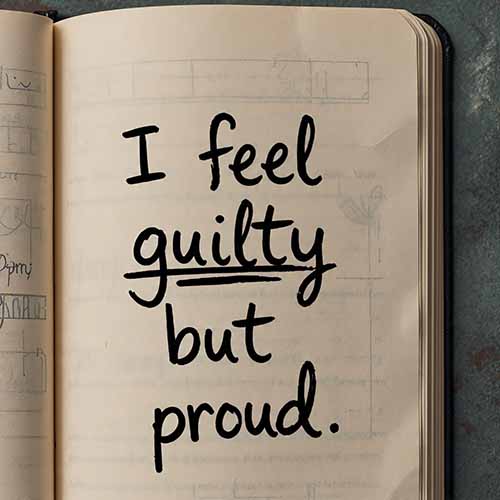
If boundary guilt is something you’ve been wrestling with, you might also relate to [our post on boundary sabotage](#) sometimes we’re the first to ignore our own no.
The Guilt of Saying No When You’re Used to Pleasing Others
They asked: “Can you help this weekend?” My throat tightened. I wanted to say no I was exhausted. But the guilt hit instantly: “What if they feel let down? What if they get mad?”
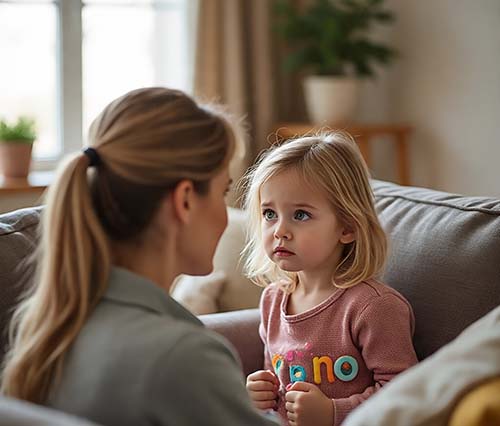
Why Saying No Feels So Hard
If your worth was tied to being helpful, rejection equals failure.
People-pleasing becomes a safety strategy avoid conflict, avoid disapproval, avoid abandonment.
How to Gently Rewire the Guilt Response
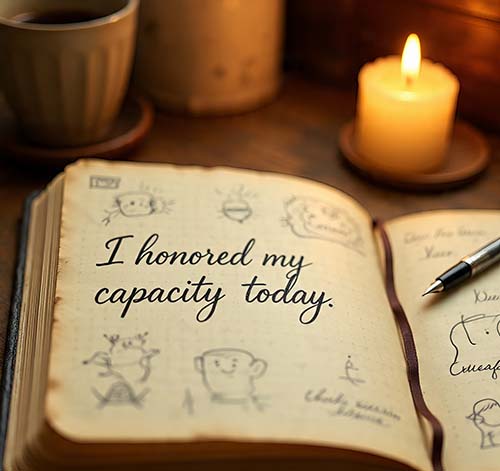
- Affirm: “Saying no protects my energy; it’s not unkind.”
- Separate your responsibility (your answer) from their reaction.
- Practice small, safe “no’s” regularly to build tolerance.
- Use delayed responses: “Let me check and get back to you.”
- Journal the relief after honoring your limits.
Boundaries Are Kindness to Both Sides
Limits create honest relationships. Saying no honors your nervous system, energy, and long-term ability to show up meaningfully not resentfully.
How to Say No Without Hurting Others
Nobody wants to hurt someone’s feelings, but saying yes when you mean no can hurt you. So, how do you say no in a way that’s kind but firm? Here’s what works:
- Be Direct but Empathetic: Try something like, “I really appreciate you asking, but I’m stretched thin right now.” It shows you care but sets your limit.
- Don’t Overexplain: You don’t owe anyone a novel. A simple “I can’t make it” is enough. I used to ramble on with excuses, but now I keep it short and sweet.
- Offer an Alternative: If it feels right, suggest another way to connect. Like, “I can’t come to the party, but let’s grab coffee next week.” It softens the no without caving.
- Practice in Low-Stakes Situations: Start with small stuff, like saying no to a coffee run. The more you do it, the easier it gets.

I tried this with a coworker who kept asking me to cover shifts. I said, “I’m sorry, I can’t this time, but let me know if there’s another way I can help.” It felt good to stand my ground without being a jerk
“Setting healthy boundaries reduces stress and supports emotional well‑being.” – pathserenity.com
Breaking Free from the Guilt Cycle
Okay, so how do you actually get over the guilt of saying no? It’s not about flipping a switch it’s about building new habits and mindsets. Here’s how to start:
- Reframe Guilt as Self-Care: Instead of thinking, “I’m letting them down,” tell yourself, “I’m saying no to this so I can say yes to my mental health.” It’s like putting on your oxygen mask first.
- Practice Self-Compassion: Treat yourself like you’d treat a friend. If you feel guilty, say, “It’s okay to feel this way, but I’m doing what’s best for me.” Healthline says acknowledging your feelings without judgment is key.
- Journal Your Thoughts: Write down why you said no and how it felt. I started journaling after saying no, and it helped me see that my guilt was just fear, not reality.
- Build Assertiveness: Practice saying no in a mirror or with a trusted friend. It sounds silly, but it works. I did this before telling my boss I couldn’t take on an extra project, and it made me feel like a badass. 😎
- Seek Support: A therapist can help you unpack why guilt hits so hard. TalktoAngel says therapy can reframe deep beliefs about saying no.
And if you’re feeling guilty about nothinglike, just a vague sense of “I’m doing something wrong” it might be anxiety or perfectionism talking. Try writing down what’s bugging you and asking, “Is this real, or is my brain just being extra?” Often, it’s the latter

You’re Allowed to Protect Yourself
You don’t owe your yes to everyone. Especially not at the cost of your energy, values, or health. Saying no isn’t an act of rejection. It’s an act of remembering your own limits and honoring them.
Saying No as an LGBTQ+ Person
For folks in the LGBTQ+ community, saying no can feel like climbing a mountain. Social pressures, family expectations, or identity struggles can make it hard to set boundaries without feeling like you’re letting someone down. A friend of mine who’s queer said they used to say yes to every family event, even when it meant facing judgmental comments about their identity. It left them drained and resentful.
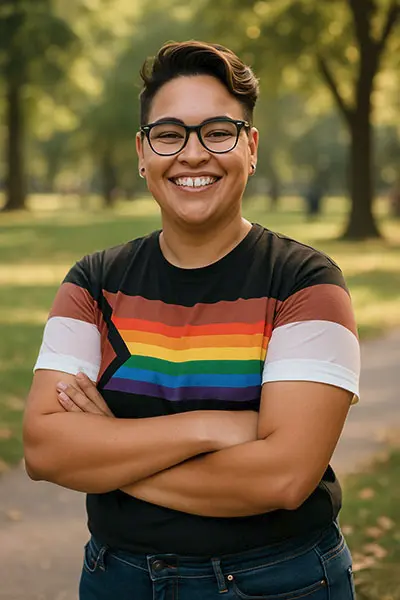
Setting boundaries can be a way to protect your mental health and create space for self-acceptance. For example, saying no to a family gathering that feels unsafe can be an act of self-love.
Try connecting with affirming spaces, like queer-friendly support groups or online communities, to practice saying no without guilt. It’s like giving yourself permission to prioritize you. 😊
The Science Behind Guilt and Boundaries
This isn’t just feel-good talk there’s science behind why boundaries matter. According to the American Psychological Association, chronic stress from overextending yourself can lead to anxiety, depression, and even physical health issues like heart disease. Setting boundaries reduces that stress by giving you control over your time and energy.
A 2019 study in Behavioral Sciences found that clear boundaries at work cut emotional exhaustion and boost empowerment. Another from Frontiers in Psychology showed that blurred boundaries increase stress and lower happiness. When you stick to your no, you’re literally protecting your brain from burnout.
| Impact | Statistic | Source |
|---|---|---|
| Stress Reduction | Boundaries reduce emotional exhaustion by 30% | Behavioral Sciences, 2019 |
| Mental Health | Poor boundaries increase anxiety risk | APA |
| Happiness | Blurred boundaries lower life satisfaction | Frontiers in Psychology, 2020 |
Conclusion
Saying no is tough, but it’s a skill worth mastering. That guilt that tags along? It’s real, but you can totally get past it. By figuring out why we feel guilty, practicing our “no,” and setting boundaries like a boss, we can stop being everyone’s yes-person and start being our own best friend.
Next time someone asks for something you can’t give, take a deep breath and say, “No, thanks.” You’re not letting them down you’re lifting yourself up. And if they try to guilt-trip you, hold your ground. You deserve to protect your peace. So, what’s your next no gonna be? 😊

Q&A
It’s often because we’re taught that saying yes is polite and no is selfish. Fear of conflict or rejection, plus people-pleasing habits, can make you feel like you’re letting someone down.
Parents carry emotional weight, and cultural norms often push us to always say yes to family. Guilt comes from feeling like you’re betraying that duty, even when you need to prioritize yourself.
Reframe it as self-care, practice saying no in small situations, and journal your feelings to process them. Remind yourself that your needs matter too.
Socialization, fear of conflict, and wanting to be liked make it tough. Plus, low self-esteem or past experiences can make you feel like your no isn’t valid.
Be direct but kind, like, “I appreciate you asking, but I can’t right now.” Offer an alternative if it feels right, and don’t overexplain.
That’s guilt-tripping a manipulative tactic to make you change your mind by making you feel bad.
It’s not a specific phobia, but it’s often tied to social anxiety or fear of rejection. Some call it people-pleasing or FOMO (fear of missing out).
Yes, it’s a sign of unhealthy communication. It shows a lack of respect for your boundaries and can be manipulative.
Practice self-compassion, journal to identify unrealistic guilt, and challenge thoughts like, “Is this really my fault?” Therapy can help if it’s persistent.
Some people with strong boundaries feel less guilt because they trust their judgment. But a total lack of guilt might point to psychopathy or low empathy, though that’s rare.

Related articles I recommend you don’t miss
Resources from this article
- Psychology Today: Defines what personal boundaries are and why many avoid setting them often due to fear and lack of self-worth
- Psychology Today: Offers clear steps like trusting your intuition and using direct communication to create and maintain healthy limits
- Harvard Business Review: Reframes saying no at work as a strategic skill protecting your priorities and allowing more meaningful yeses
- Harvard Business Review: Shares a research‑based framework for evaluating requests and saying no with confidence and clarity
How to Start Saying No Without Guilt
Time needed: 5 minutes
How to Start Saying No Without Guilt
- Know Your Why
Write down why you need to say no maybe to protect your time or energy.
- Practice Small Nos
Start with low-stakes situations, like skipping a coffee date.
- Use “I” Statements
Say, “I need some downtime,” instead of overexplaining.
- Be Consistent
Tell yourself, “Saying no is self-care, not selfishness.”
- Journal Your Feelings
Write about your guilt to process it and see it’s not always real.
- Get Support
Talk to a friend or therapist to build confidence in your boundaries.
✨ Last updated on 11.08.2025
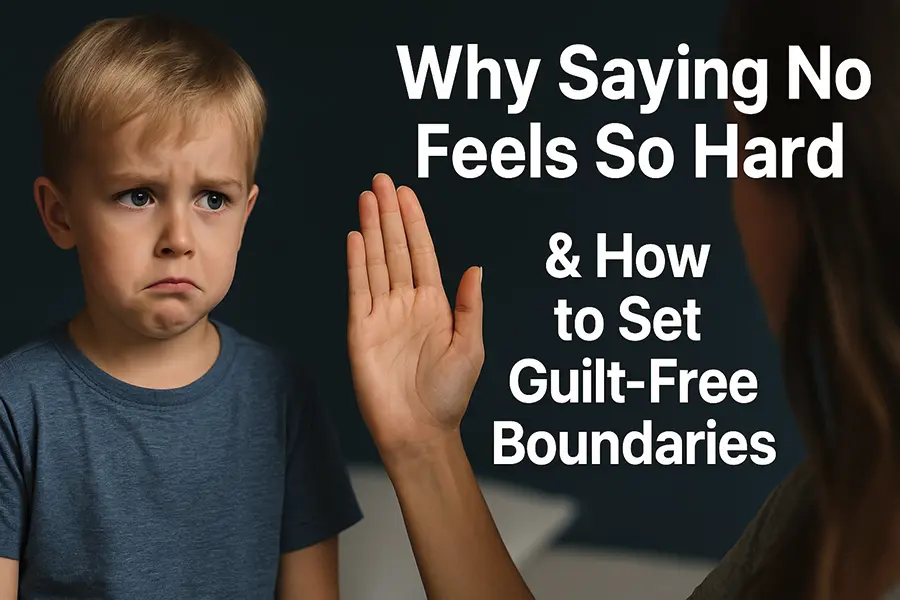










Leave a Reply